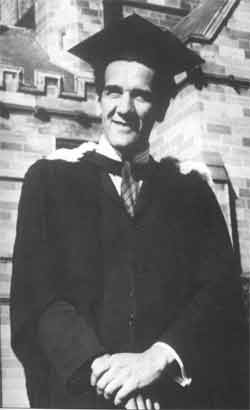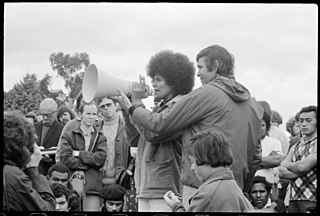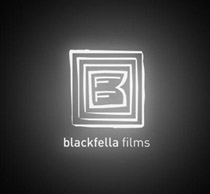
Deborah Jane Mailman is an Australian television and film actress, and singer. Mailman is known for her characters: Kelly Lewis on the Australian drama series The Secret Life of Us, Cherie Butterfield in the Australian comedy-drama series Offspring, Lorraine in the Australian drama series Redfern Now and Aunt Linda in the Australian dystopian science fiction series Cleverman. Mailman portrayed the lead role of MP Alexandra "Alex" Irving on the Australian political drama series Total Control.

Charles Nelson Perkins, usually known as Charlie Perkins, was an Aboriginal Australian activist, soccer player and administrator. It is claimed he was the first known Indigenous Australian man to graduate tertiary education. He is known for his instigation and organisation of the 1965 Freedom Ride and his key role in advocating for a "yes" vote in the 1967 Aboriginals referendum. He had a long career as a public servant.
Mark Doyle, better known by his stage name Louis Nowra, is an Australian writer, playwright, screenwriter and librettist.

Marcia Lynne Langton is an Aboriginal Australian writer and academic. As of 2022 she is the Redmond Barry Distinguished Professor at the Melbourne School of Population and Global Health, University of Melbourne. Langton is known for her activism in the Indigenous rights arena.
Blackfella is an informal term in Australian English to refer to Indigenous Australians, in particular Aboriginal Australians, most commonly among themselves.

Rachel Perkins is an Indigenous Australian film and television director, producer, and screenwriter. She founded and was co-director of the independent film production company Blackfella Films from 1992 until 2022. Perkins and the company were responsible for producing First Australians (2008), an award-winning documentary series that remains the highest-selling educational title in Australia, and which Perkins regards as her most important work. She directed the films Radiance (1998), One Night the Moon (2001), Bran Nue Dae (2009), the courtroom drama telemovie Mabo (2012), and Jasper Jones (2017). The acclaimed television drama series Redfern Now was made by Blackfella Films, and Perkins directed two episodes as well as the feature-length conclusion to the series, Promise Me (2015).

Gordon Briscoe AO was an Aboriginal Australian academic and activist. In 1997, he was awarded a PhD from the Australian National University. He was also a soccer player.

Warwick Thornton is an Australian film director, screenwriter, and cinematographer. His debut feature film Samson and Delilah won the Caméra d'Or at the 2009 Cannes Film Festival and the award for Best Film at the Asia Pacific Screen Awards. He also won the Asia Pacific Screen Award for Best Film in 2017 for Sweet Country.

Redfern Now is an Australian drama television series featuring the lives of Aboriginal Australian families living in Redfern, Sydney, that first aired on ABC1 in 2012. A second season followed in 2013, and the series concluded with a feature-length telemovie, Redfern Now: Promise Me, in April 2015. The series' release contributed to widespread public debate surrounding Indigenous representation in the Australian media, and both series as well as the film were nominated for and won many awards.

Blackfella Films is an Australian documentary and narrative film production company headquartered in Sydney, founded in 1992 by Rachel Perkins. The company produces Australian short and feature-length content for film and television with a particular focus on Indigenous Australian stories. Its productions have included the documentary series First Australians and The Australian Wars, the documentary film The Tall Man, the television film Mabo, and the drama series Redfern Now and Total Control.
First Contact is an Australian reality television documentary series that aired on SBS One, SBS Two and NITV from November 2014. A second season aired in 2016. The show, produced by Blackfella Films and presented by Ray Martin, takes six European Australians on a journey across Australia, challenging their preconceived ideas about Indigenous Australians. In the second season, the non-Indigenous participants are all well-known Australians.

The Tall Man is a 2011 Australian documentary film directed by Tony Krawitz. It is about the death of Cameron "Mulrunji" Doomadgee in police custody on Great Palm Island, Palm Islands, Queensland on 19 November 2004.
Blood Brothers is a 1993 four-part Australian documentary film series that tells the stories of three different Aboriginal Australian men, and an Aboriginal ceremony.
Dr Keith Vincent Smith is an Australian writer, historian and journalist. He has become a notable specialist on early Sydney and Indigenous Australians of the Sydney area, including the lives of the Eora peoples, Bungaree, and Bennelong.
Sally Riley is an Australian filmmaker, writer, producer and media executive, as of 2021 Head of Scripted Production at the Australian Broadcasting Corporation (ABC).
Darren Dale is an Indigenous Australian film and television producer. He joined film production company Blackfella Films as a producer and later co-director, and as of August 2024 is managing director. Dale is known for co-producing many films and television series with Miranda Dear since 2010, with their most recent collaboration being the second season of Total Control.
Beck Cole is an Australian filmmaker of the Warramungu and Luritja nations. She is known for her work on numerous TV series, including First Australians, Grace Beside Me, Black Comedy and Wentworth, as well as documentaries and short films. She is based in Alice Springs, in the Northern Territory.

The Australian Wars is a three-part 2022 documentary series about the Australian frontier wars, directed and narrated by Indigenous Australian filmmaker Rachel Perkins and made for SBS Television. Using interviews, re-enactments, archaeological research, and original documents, it explores massacres in Sydney, Tasmania, and Queensland.
Dena Curtis is an Australian film producer and director. She is known for writing and directing several short films, and directed the first series of ABC Television comedy series 8MMM Aboriginal Radio in 2015. She co-developed and co- produced the 2018 children's TV series Grace Beside Me, and co-produced the documentary series First Weapons (2023) and Firebite (2024). She is the owner of production company Inkey Media in Brisbane, Queensland.
Miranda Dear is an Australian film producer, who worked with Darren Dale at Blackfella Films for ten years. She is especially known for many acclaimed TV series, including Redfern Now and Total Control.









